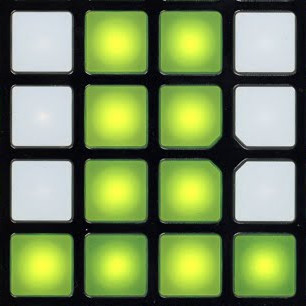256a-fall-2017/hw3: Difference between revisions
Appearance
| Line 79: | Line 79: | ||
=== Deliverables === | === Deliverables === | ||
* 0) source code to the project ( | * 0) source code to the project (entire zipper Unity project folder) | ||
* 1) screenshots of your step sequencer in action | * 1) screenshots of your step sequencer in action | ||
* 2) design sketches (scan them in if necessary) | * 2) design sketches (scan them in if necessary) | ||
Revision as of 02:40, 18 October 2017
Homework #3: AudioVisual Music Sequencer
NOTE from Ge: this image is here mostly for its colors, PLEASE DON'T MAKE IT LOOK LIKE THIS (NECESSARILY)!
timeline:
- part A (research + on-paper design + something working) due: 2017.10.23, in-class Monday (be prepared to present)
- part B (implementation) due: 2017.10.29 11:59:59pm, Sunday.
- part C (demo/mini-performance)) due: 2017.10.30, in-class Monday
Almost inevitably at some point in one's music software design journey, you'll be asked/tempted to make a step sequencer. In this assignment, we are going to get that off our chest/out of our system, and make a crazy, real-time, audio-visual software, driven by some type of step sequencer!
(Part 1 of 3): Research + Preliminary Design + Something Working
- due in-class Monday (10/23)
- do research on music sequencers!
- compile a list of useful references on various types of step sequencers / designs (articles, papers, images, etc.)
- sketch your own preliminary design of a real-time audio-visual step sequencer!
- what features to include?
- what does it look like? linear? circular? spherical? mobius?!? a game? a galaxy??
- sequencing of pitch? dynamics (loundness)? envelopes (attack/decay/sustain/release)?
- how many parallel tracks / layers / or different types of sound? (e.g., track 1 synth, track 2 drum etc)
- how input the sequence (in real-time)?
- how does it sound? will it use synthesis? load audio samples? MIDI?
- can you save/load sequences? what file format? should we have a common Music256a/476a format?!
- how to control/depict tempo?
- sketch as much as detail as possible, even if you don't end implementing them!
- hand in scans of your paper designs and be ready to present on Monday! (scans of these design sketches can go onto your website for this project!)
- have something working in software, towards your core idea/aesthetics!
- can start from chunity boilerplate
(Part 2 of 3): Implementation
- due 2017.10.29 11:59:59pm, Sunday
- decide on a design + set of features for an real-time audio-visual step sequencer; the design decisions should account for the questions raised in part 1 above!
- implement a working prototype of your step sequencer
- should use:
- unity
- chunity
- see chunity tutorials (skip the "setup" step)
- potential things to sequence:
- pitch
- dynamics
- different timbres / instruments
- envelopes
- requirements / high-level functional aesthetic goals
- must be graphical
- must be interactive
- must be musical
- timing should be tight (driven from audio/chuck, not from graphics callback)
- should be flexible in usability
- should support some narrative complexity
- should feel satisfying to use
- "hints"
- think of user/interaction design **and** software/system design
- create an audio engine, as well as a graphics engine; how do they interact?
- having a "grid" is optional!
- create a webpage for your audiovisual sequencer, which must contain:
- one or more screenshot(s)
- your initial design sketches + research, motivate and articulate how you made your design decisions
- system design: how is your software architected? recommend a class diagram!
- the code for download
- (your musical statement: stuff from part 3 below)
(Part 3 of 3): Musical Statement + In-Class Presentation
- due: in-class Monday (10/30)
- using your sequencer, create a short musical statement;
- make a VIDEO of you performing it!
- do a live presentation of your step sequencer in class!
Note
- as always, have fun with it!!! P.S.!!! make it SATISFYING!!!
- comment your code!
- choose your own coding conventions - but be consistent
- you are welcome to work together, but you must do/turn in your own work (you'll likely get more out of it this way)
Deliverables
- 0) source code to the project (entire zipper Unity project folder)
- 1) screenshots of your step sequencer in action
- 2) design sketches (scan them in if necessary)
- 3) your musical statement!
- 4) instructions on building the project (for example, anyone in the class should be able to download
- 5) instructions in using your step sequencer
submit to canvas!
if you have a CCRMA account, additionally turn in all files by creating a new CCRMA webpage: http://ccrma.stanford.edu/~YOURID/256a/hw3/
